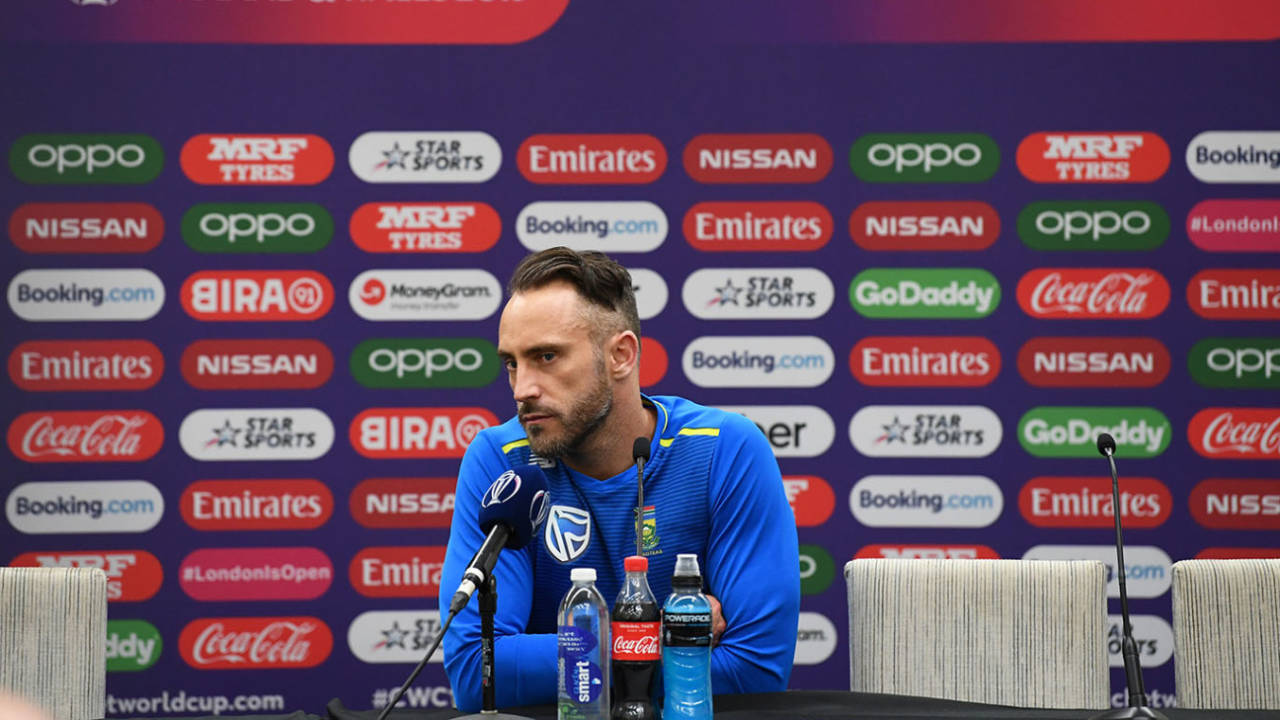Such is the plight of South Africa at major tournaments, that two losses to start - even when one was at the hands of the tournament favourites - have begun to spark fears of a full-blown unraveling.
This, after all, is the stretch of the tournament that is supposed to give South African sides the least amount of grief. There are occasional hiccups in the early stages, such as the loss to India
in 2015, or the defeat to England
in 2011, but there is generally no serious despair. A little hesitancy, perhaps, but with that also, a hope that this is the year in which those infamous shackles fall.
But the thing with South Africa is that where for every other team one World Cup failure is distinct from the other - separated by a neat four-year period in which new narratives have been allowed to develop - South Africa's shortcomings are cumulative. There is a decades-old trajectory: Dale Steyn's hard-length ball to Grant Elliott at Eden Park is connected to to
Faf du Plessis running out AB de Villiers in Mirpur, which, in turn, links to that bewildering miscalculation at Kingsmead, and that to Allan Donald's panicked fingers and tragically abandoned bat at Edgbaston. There is so much psychological anguish here, that even just the plain old "being beaten by the better team on the day" is subsumed by the larger, historical narrative. Lines are blurred. Where does straightforward loss end, and that other thing begin?
So, South Africa arrive in Southampton now, knowing they must probably win five of the remaining seven matches to have a hope of moving into the knockouts, and with India - one of the world's best teams - to overcome in their upcoming outing. Where in past tournaments, South Africa's traumas did not begin haunting them until at least the approach to the knockout stage, this time they are forced to confront the thing they are least fond of confronting earlier than they are used to having to confront it.
They could always choose not to confront it of course. They could refuse to acknowledge the elephant that appears every time play a multi-team event, and just hope that eventually, it will grow tired of trumpeting, stomping and crapping all over their dressing room. You suspect South Africa captains have tried this before. Graeme Smith, for example, would bristle whenever anyone uttered that C word in a press conference. (So intimidating a force was he, that even now, his commanding spectre haunts the cricket lexicon.) But never has ignoring the problem enabled South Africa to surmount it. Nor, however, has tackling it head-on - a strategy they have tried repeatedly, having motivational gurus set up shop in their backroom through the course of major tournaments. In seven preceding World Cups, they have not made it to the final once.
This leaves du Plessis in kind of a tough spot here, don't you think? While other captains merely wrestle with team composition, strategy and batting order, a South Africa captain's primary challenge at any World Cup now runs towards the profound. There are signs that he has struck a healthy balance between ignoring completely, and embracing that identity as a means of overcoming it, but none of this will mean much if there is ultimately no deliverance. The next few matches will perhaps be as great a psychological examination as he has ever had.
India, in contrast, could hardly be less burdened. They are fresh - Wednesday's encounter being their first of the tournament. And where South Africa are recipients of big-tournament trauma, India are inflicters, now with a record of having bruised Bangladesh over the course of several years, in addition to Pakistan in World Cups. It might be tempting to suggest they are preparing to pounce on this opposition's weakness - but that somehow doesn't seem right for Kohli's side. They will play how they play, which is to say probably very well. In Southampton, India are the rock South Africa must avoid running themselves aground on, because a third consecutive loss to begin a tournament could unleash a kind of anguish that even they are unaccustomed to.
